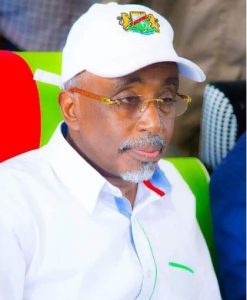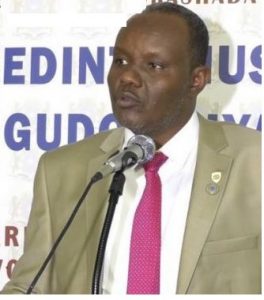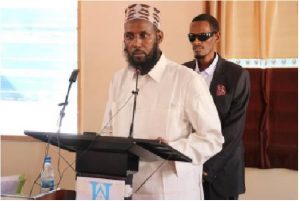By Hassan M. Abukar
Somali politics, like the control panel of a complex machine, has many switches. The actors are the same, but the circumstances change from day to day.
Until ten days ago, Mukhtar Robow, the former number two man in Al-Shabaab, was nearly relegated to the dust-bin of history in the presidential elections of the South West (SW) regional state. The Somali federal government, which had initially allowed him to run for office, suddenly issued a letter banning him from contesting the elections. Now, he has been allowed to proceed in the elections. The current electoral crisis in the SW is due to a confluence of conditions in the region and the federal government’s desire to remove the current President of the SW, Sharif Hassan, and to install a puppet leader in the region.
Now the major questions swirling around for November 17 elections are: Who are the major candidates? Who is backing whom? What kind of outcome can be expected?
A beleaguered SW president

As President of the SW, Sharif Hassan has become a worry and irritation for the federal government. He is one of the four regional heads of states who have severed ties with Mogadishu’s federal government. The latter has been working behind the scenes to unseat these states and advance candidates amenable to Mogadishu. Sharif Hassan has made things worse for himself by severing ties with Mogadishu, and his chances of re-election are slim.
In terms of security, economic development and good governance, Sharif Hassan has done little for the region. Al-Shabaab still controls large swaths of land in the SW, making travel between towns impossible. The state government is controlled by Sharif Hassan’s family, creating an environment in which the educated class is excluded. In the last four years of his term, Sharif Hassan has spent only 74 days in Baidoa, the seat of the temporary transitional government of the SW and the presidential palace is open only when Sharif Hassan is in town, a rare event indeed.
Most of the top leaders of the federal government want to replace Sharif Hassan, but he has strong support from Prime Minister Hassan Kheyre.
Sharif Hassan’s residual influence in the SW cannot be downplayed, and If he withdraws from the race, his absence will be conspicuous. He has survived political setbacks in the past that would have ended a more seasoned politician’s career. He has held positions as former speaker of the federal parliament, finance minister, and deputy prime minister, to name a few. The resurrection of Sharif Hassan in another position in Somali politics would not be a surprise.
Abdiaziz Lafta Gareen

Abdiaziz Lafta Gareen, a Somali parliamentarian, is one of the top candidates for the presidency of the SW. He was one of the most active legislators used by the federal government to topple former speaker Mohamed Jawari. When the speaker resigned, Lafta Gareen expressed his desire to campaign for the speakership, but the federal government leaders had another person in mind—the former defense minister, Mohamed Mursal.
As a compromise, the federal officials promised Lafta Gareen the full backing of the federal government for his candidacy for the presidency of the SW. Now, he wants to make good on that pledge. He has the support of President Farmajo, who belongs to the same clan as Lafta Gareen’s mother.
Hussein: Mr. Intelligence
The Somali National Intelligence and Security Agency (NISA) and its shadowy deputy leader, Fahad Yasin, have their pick for the SW elections. It’s Hussein Osman Hussein, who, until a month ago, was the head of NISA. Hussein is hobbled by his poor rating among candidates and lack of support from SW legislators.
Mukhtar Robow
Robow is perhaps the one candidate who enjoys rock star celebrity status in the SW. The former terrorist leader gained more popularity among the people of the SW when the federal government tried to ban him from running for office. His popularity can be attributed to the public’s stance of poking the federal government in the eye for meddling in the electoral process.

Robow has been sounding a lot like a veteran politician in his appeal to the educated class in the region to participate more in the political process and for the inclusion of women in government. He has promised to fight Al-Shabaab to the teeth and to re-open the closed road between Baidoa nd Mogadishu.
Robow’s major obstacle is that, at the end of the day, the presidency isn’t chosen by the residents of the SW but by the region’s legislators.
Aggressive federal government interference
Recently, the federal government brought more than 100 members of the SW to Mogadishu. At the time of this writing, they were given more than $5,000 each. I asked a top federal official the reason for hosting these legislators in Mogadishu.
“It’s part of a capacity-building training funded by Sweden,” he answered.
“And the money?”
“It’s actually a lump sum for the salaries they haven’t received for the past five months.”
“Did the state legislators from Jubbaland and Puntland receive the same capacity-building training?”
The official declined to comment.
Ten members of the SW Electoral Commission resigned this week to protest the federal government’s interference in the state election—a provocative move meant to draw attention to the corruption at the heart of the Somali electoral process.
The blatant federal meddling in SW’s regional election through brazen bribery is only the beginning; it will continue until 2020 in other states. Farmajo’s government deserves an A grade in one area: how to destroy federalism by weakening federated regional states and by having no qualms about using corrupt money.
Meanwhile, for the SW’s coming elections, it is difficult to predict which candidate will win the presidency. Regardless, two things are certain to happen: corrupt money will follow like water and the public’s confidence in the political system will continue to wane.
Hassan M. Abukar
Hassan M. Abukar is a writer, a contributor to Wardheernews, and the author of Mogadishu Memoir. He can be reached at: [email protected]
We welcome the submission of all articles for possible publication on WardheerNews.com. WardheerNews will only consider articles sent exclusively. Please email your article today . Opinions expressed in this article are those of the author and do not necessarily reflect the views of WardheerNews.
WardheerNew’s tolerance platform is engaging with diversity of opinion, political ideology and self-expression. Tolerance is a necessary ingredient for creativity and civility.Tolerance fuels tenacity and audacity.
WardheerNews waxay tixgelin gaara siinaysaa maqaaladaha sida gaarka ah loogu soo diro ee aan lagu daabicin goobo kale. Maqaalkani wuxuu ka turjumayaa aragtida Qoraaga loomana fasiran karo tan WardheerNews.
Copyright © 2024 WardheerNews, All rights reserved


